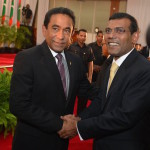No additional reporting by missing journalist Ahmed Rilwan
The Maldives is facing an authoritarian reversal with a corrupt judiciary, impunity for human rights abuses, and growing religious extremism, opposition Maldivian Democratic Party (MDP) MP Imthiyaz Fahmy has warned.
In a lecture titled ‘The Maldives backtracking on democracy: human rights violations, impunity, and increasing religious extremism’ delivered last Friday (September 26) at the University of Western Australia in Perth – organised by the Centre for Muslim States and Societies – Imthiyaz stressed that the country’s problems “have nothing to do with Islam.”
“But our fear is that authorities are using few extremist individuals for their short-term political gain. This gives these few extremists a voice and influence in politics that they don’t deserve,” he explained.
“Our fear is that the lack of actions by the authorities against these few individuals could increase their influence in the society. This can be one of the biggest long-term challenges to our hopes for democracy.”
While “pundits and some ill-informed Western policy makers conclude that Islamic civilisation is in a clash with Western civilisation,” Imthiyaz argued that the “actions of a few extremists” did not warrant concluding that Islam was not compatible with democracy.
“Extremism of these individuals is not only incompatible with democracy, but most importantly for Muslims like Maldivians, Islam is not compatible with extremism,” he said.
Referring to reports of Maldivian jihadists fighting in Syria, Imthiyaz stressed that the vast majority of Maldivians were peaceful and remained “committed to the moderate values of Islam.”
Transitional justice and impunity
The turning point for the Maldives journey to democracy was the custodial death of Evan Naseem in Maafushi jail and subsequent prison shootings in September 2003, Imthiyaz observed.
Prior to the first multi-party democratic election in October 2008 following the adoption of a revised liberal constitution, Imthiyaz said the country was “ruled with an iron fist” by former President Maumoon Abdul Gayoom, whose 30-year reign was characterised by oppression, censorship, and torture.
“The judiciary used to be the instrument which endorsed all those human rights violations and injustices that took place in the country,” he contended.
The Maldives became a forerunner to the Arab Spring, Imthiyaz continued, with the defeat of the “Egyptian-like dictatorship” in the October 2008 presidential election.
The challenges faced by the first democratically-elected government included the absence of a “transitional justice mechanism” to address human rights violations of the past, an unreformed judiciary, and incompatibility of coalitions with a presidential system, he explained.
Consequently, the MDP government was toppled in a “coup d’etat” on February 7, 2012 when former President Mohamed Nasheed was “forced to resign by mutinying police and army generals backed by politicians associated with the former dictatorship.”
Imthiyaz noted the police brutality in the aftermath of the transfer of power, particularly the heavy-handed crackdown on an MDP protest march on February 8, 2012.
He also referred to Amnesty International warning that “any attempt at political reconciliation in the Maldives would be meaningless” without accountability for human rights abuses.
Imthiyaz added that hundreds of MDP members as well as leaders were facing “selective prosecution” by the state.
Despite numerous calls by the Inter Parliamentary Union (IPU) for the government to investigate arbitrary arrests, attacks and harassment of MDP MPs, Imthiyaz said “the perpetrators have been enjoying complete impunity.”
He also observed that the Supreme Court’s repeated interference in last year’s presidential polls was criticised by the UN, the European Union, and the Commonwealth.
While the apex court dismissed the chair and deputy chair of the Elections Commission less than two weeks before the parliamentary elections in March, Imthiyaz noted that the court is currently conducting suo moto proceedings against members of the Human Rights Commission of Maldives.
Referring to the UN Special Rapporteur on the Independence of Judges and Lawyers questioning the court’s independence and impartiality, Imthiyaz said the Supreme Court was widely perceived as “as an instrument of partisan revenge than as a forum for impartial justice.”
Threats to MPs
The “growing threat” to MPs was another challenge for democracy, Imthiyaz continued, referring to the brutal murder of MP Afrasheem Ali – which police investigated in a “politicised” manner – and the stabbing of former MDP MP Alhan Fahmy.
“Death threat messages have been pouring on MDP MPs mobile phones. Yet the authorities do not seem to care at all,” he said.
The IPU has said that the government’s reaction would be “a test of the country’s democratic credentials.”
Imthiyaz noted that the Maldives dropped to 108th place in the RSF Press Freedom Index for 2014.
While the perpetrators behind the arson attack on Raajje TV last year have not been prosecuted, Imthiyaz said police have not conducted “a proper investigation” into the disappearance of Minivan News journalist Ahmed Rilwan and were “unable to establish whether they are now investigating a missing person case, or an abduction case or a murder case.”






“any attempt at political reconciliation in the Maldives would be meaningless”
I warned you, didn't I? Back in 2008?
But you guys were so eager to play Mandela that you didn't listen.
Maldivian: please note it is only meaningless "without accountability for human rights abuses."
We cannot lock up and punish every single one of the old regime. We are too small a society for that. We would need a similar system as implemented by South Africa after the fall of apartheid in the form a "truth and reconciliation" process.
As usual MDP people excel at lying. On the day of Giyama when they have to account for the lies they spread they will regret every moment of it. The fact is Maldives is not becoming any more autocratic or any such thing. What happened is people just got tired of MDP islam bashing and gave power to the lesser devil. Nothing more.
Maumoon Gayyoom's dictatorship and the coup-regime and the Yamin Gayyom's govt are all put on the defensive. But why?
Thats why counrtries UK, Asutralia etc are invited MDP officials for lectures on subjects such as democracy human rights global warming etc...how many lies should you make dhivehistan?
Good job Imthiyaz.
Should've talked about 2007 Sultan Park bombing and the dangers of extremism to foreigners and tourists to Maldives.
No hope in fixing Maldivian judiciary.
Backtracking into barbarism could have been a better word; perhaps!
@ Maldivian on Sun, 28th Sep 2014 7:20 PM.
A try, was not good enough to wipeout the bitter fact that poor judgement was made about the fact that the nation were having a multitude of people who had difficulty of coming out of the cocoons they were in; and could afford shun away and eat nothing except for what is faithfully and truly ear
When MDP was in power ,the oppression we faced was part of the democracy and threats and warning given to public who are not in agreement with Nasheed were alienated and treated like alien was part of democracy .
When MDP got a simple majority in the parliament with the coalition with the DRP, what they have done during few weeks of the simple majority was a classical example of democracy . Those Dramas were played to enhance democratic values.
When this MP Inthi, openly told public to obey MDP and follow MDP principle to get privileges or left behind to get public services from the Gov, was part of democracy .
When a suspected criminal was allowed to hide in the parliament house was to improve the democracy in the country.
@Afraid of the Darkness: I was actually referring to the fact I had delivered evidence of adhaalath party's planned betrayal, but they told me that I was a war-obsessed extremist militant trying to cause 'fithna'.
Who's laughing now?
And now that we all know that the adhaalath party uses gangs known for heroin trafficking, looting and even murder to carry out their agenda, I say they should have been brought to justice.
This way, the rest of the Maldivians should not have to face the terror of being ruled by the gangs.
Here's my two cents for policymakers and foreign partners:-
1. Help us strengthen our education system - we need better training & exposure for local teachers, foreign expertise & equal access to proper training in a foreign language which is essential to widen the knowledge base of a society which lacks the necessary literature in the local language. A BETTER EDUCATED PUBLIC MIGHT HELP DISSUADE POLITICIANS FROM USING ISLAM AS A POLITICAL TOOL (Please note that ALL political parties are guilty of this).
2. Help us address a vicious cycle whereby the young in the rural areas are forced to migrate to Male' for employment/educational opportunities/better medical treatment BUT end up on the losing end of a job market where they are at a disadvantage because of a perceived/real lack of education/sophistication in comparison to the privileged in Male. The sub-standard education given in most of the rural areas means that high-school leavers form those areas are unfit for highly-skilled/skilled/technical work while the education system indoctrinates them to refuse any other form of employment. This results in inability to secure and retain jobs while those who do get work are often subjected to wage slavery and no hope of career advancement. Meanwhile meager incomes bar access to proper housing in the limited & expensive capital city forcing ever-increasing numbers to raise their young in congested environments leading to a host of social ills that the government is not equipped to deal with.
3. Help us move away from a warped tertiary education system which focuses on academic rather than professional training. This is made all the more problematic when we take into account the fact that we lack the human resource to provide adequate training in academic disciplines. Meanwhile tertiary training institutes are subject to minimal/non-existent regulatory regimes and standards. The result is the growth of institutions which provide highly suspect certifications that do not help the certified secure meaningful employment. Successive governments have tried to salvage the image of these sub-standard institutions by reserving jobs in public service for them. However this results in poor productivity on the part of employees and exploitation by employers who know they are hiring someone who has a nominal certification and would be prepared to do other "favors" to remain employed.